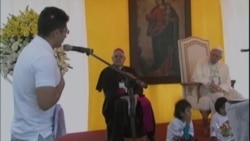Pope Francis received a festive welcome Friday in Paraguay, the last stop of his South American tour.
The pope was welcomed at the airport in Asuncion by Paraguay's President Horacio Cartes along with a girls' choir and dancers in traditional dress.
Francis will celebrate two Masses while in the country and is also scheduled to visit a children's hospital and tour poor neighborhoods.
Earlier Friday, the pope wrapped up his pilgrimage to Bolivia with a visit to the violent and overcrowded Palmasola prison. He hugged inmates and urged them not to despair or align with gangs. He also urged prison guards to treat the prisoners with dignity.
Palmasola is the most notorious of Bolivia's 32 prisons, built to hold about 800 people but housing 5,000, more than four in five still awaiting trial. Two years ago, 36 people died in a fierce battle between rival gangs using machetes and homemade flamethrowers.
Bolivia has a notoriously corrupt judiciary, with some 1,000 judges and 300 prosecutors under investigation or on trial for corruption.
Corporate greed, colonialism
On Thursday, the Argentinean-born pope spoke out against corporate greed and apologized for colonialism in the Americas in a speech to groups working for the unemployed, the landless and the impoverished.
Addressing the World Meeting of Popular Movements in Santa Cruz, Bolivia, Pope Francis asked, "Do we realize that something is wrong in a world where there are so many farm workers without land, so many families without a home, so many laborers without rights, so many persons whose dignity is not respected?"
He spoke of the "new colonialism" to his audience of grassroots organizers, saying it appears at times as the "anonymous influence" of corporations, loan agencies, some free trade measures, and austerity measures that impact the lives of the poor.
Climate change
The pope also spoke of climate change, echoing his landmark encyclical published last month that connected climate change to human civilization. He said corporate greed has imposed a mentality of "profit at any price" with no concern for destruction of nature.
The pope apologized for historical offenses caused by the Roman Catholic Church, but also for those caused by white colonists who settled America at the expense of native peoples. He praised those in the Latin American indigenous peoples' movement for embracing the mingling of cultures rather than the suppression of them.
Strained relations
The pope arrived in Bolivia Tuesday and was greeted by Bolivian President Evo Morales. It was the second leg of his three-nation tour of his home continent of South America.
The pontiff told a crowd of thousands who gathered at the airport in the capital, La Paz, that Bolivia "is making important steps towards including broad sectors in the country's economic, social and political life."
Morales said the visit of the Argentinean-born pope represents support for the "liberation" of the Bolivian people. Relations between Bolivia's Catholic Church and the Bolivian government became strained after Morales, the country's first indigenous leader, first took office in 2006, but have improved since Francis's election in 2013.
The pope later traveled into La Paz for talks with Morales and other political and civic leaders. During the trip, Francis stopped his motorcade at the spot where the body of Jesuit Priest Luis Espinal was found in 1980 after he was arrested and tortured by Bolivian paramilitary squads.
Francis also visited Ecuador at the start of three-nation tour of his home continent of South America.








